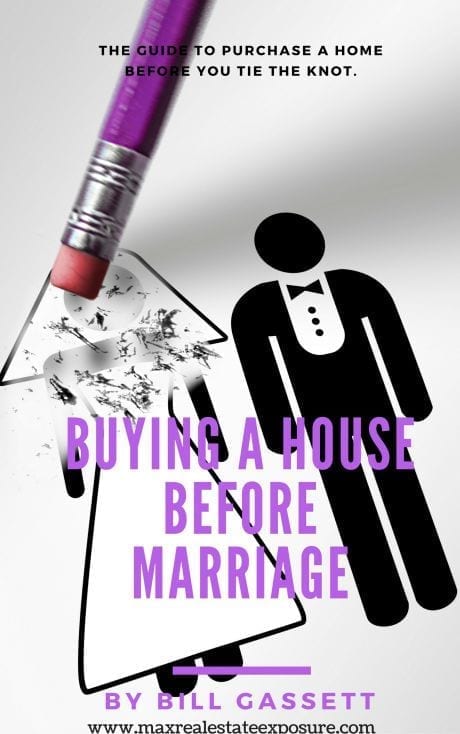 One of the questions I am sure many kids ask their parents is, should we buy a house before marriage or wait until after the wedding?
One of the questions I am sure many kids ask their parents is, should we buy a house before marriage or wait until after the wedding?
Whether it is better to buy a house before or after getting married is debatable.
Considerable thought should be given to buying a house before marriage. Purchasing property before marriage can lead to financial entanglement, which might complicate matters if the relationship ends.
Couples buying a house in community property states should be especially cautious, as these laws can affect property ownership after marriage.
A Coldwell Banker study found that a quarter of younger couples between 18 and 34 are buying a home before getting married. Another study found that around 58 percent would consider it.
These are considered millennial home buyers.
If you and your partner are considering a home purchase, you must take appropriate steps to protect yourself during and after the purchase.
While it can feel “unromantic” to talk about finances, legal protections, and what you plan to do if things don’t work out, failing to be smart about your life’s most significant financial purchase can lead to substantial regrets.
In fact, without proper planning, you’ll probably increase the odds of needing to sell the home due to a breakup.
Even though you are not married, you might have many of the same issues as if you were going through a divorce!
Preparing for a home purchase as an unmarried couple requires little effort, including honest conversations and careful planning.
Otherwise, you may consider buying a house after divorce instead of celebrating a successful marriage.
Interesting Facts and Statistics
1. Buying a house before marriage can be a significant financial decision for couples.
2. It allows couples to invest in property and potentially build equity together.
3. Each partner’s financial contribution toward the house purchase may affect ownership rights.
4. It’s essential for couples to discuss and clarify ownership arrangements, such as joint tenancy or tenancy in common.
5. In case of a breakup, having an explicit or prenuptial agreement can help address property division issues.
6. Approximately 25% of couples in the United States choose to buy a house together before getting married.
7. Studies show that one out of every four millennials prefer to invest in buying a house before tying the knot.
8. Over 35% of couples who purchase a house before marriage report higher satisfaction levels in their relationship.
9. Research indicates that couples who buy a house together before marriage have a 15% lower divorce rate than couples who don’t.
1o. In the past decade, there has been a 20% increase in unmarried couples purchasing homes together compared to previous generations.
Considerations Before Buying as an Unmarried Couple
Should you buy a house before getting married? We will cover everything you need to know about buying a home, whether you are married or single.
Let’s examine some of the concerns.
What Are Your Current Finances?
You and your partner need to be completely clear about your financial situation. You’re about to make a major purchase together, and like any business transaction, you need to know that your partner can hold up their end of the bargain.
You and your partner will share current information about your credit score, debt, income, and other financial obligations.
This information will be required to get a mortgage anyway, so it will come out into the open before you can purchase the home.
There Are Legal Implications
One critical thing couples purchasing before marriage need to understand is debt obligations. Each party is responsible for the total debt when you co-sign a mortgage.
What does this mean in the real world? You’ll be held responsible if you and your partner split and one party decides not to pay the mortgage.
If things go sour, you can be in a terrible spot. For this reason, many financial planners recommend not buying a home for more than one person’s salary.
If there is a breakup, you can still afford the mortgage, even if only temporarily. Again, this is where discussing finances before purchasing becomes very important.
Having a mortgage married vs. unmarried is an essential consideration for any couple.
Check out these mortgage tips for first-time buyers to be financially prepared for home ownership. Preparing financially is one of the most crucial things when debating buying a house before or after marriage.
You’ll also get some great advice by checking out these twenty things to do before buying a home.
Good Credit Scores Are Essential
 Your credit and partner’s scores are significant factors in your ability to get a mortgage.
Your credit and partner’s scores are significant factors in your ability to get a mortgage.
A higher credit score tends to ensure a better mortgage rate, which can save you tens of thousands of dollars over the life of the loan.
Before you buy, you want to know precisely what both of your credit scores are.
If necessary, you can consider lumping together your scores as a married couple, but you can keep them separately as an unmarried couple.
You can have the person with the better score apply for the mortgage, thus avoiding the drag of the lower credit score on the loan terms.
But remember that when the person with the better score takes out the loan, only their income is considered for the home purchase.
The single income will need to be enough to pay the mortgage – which may or may not be a problem in your circumstances.
Remember, credit scores play a significant role in getting the lowest mortgage interest rates. Analyze your current credit and try to improve your score before purchasing.
Increasing your credit score could save you thousands of dollars over the life of the loan.
The three major credit reporting agencies must give one free report yearly. You can download your three free reports online if you haven’t requested a free report in the past year.
You can go to the Annual credit report to get all three. There are minimum credit scores to buy a home. However, your goal in buying a house together before marriage should include raising your scores as high as possible.
You’ll be rewarded for it!
What Do Your Future Finances Look Like?
Money problems are one of the leading causes of relationship troubles for married or unmarried couples. And few purchases can lead to money problems more quickly than buying a home.
You and your partner need to draft an agreement—on paper—that outlines who will pay for what and how much.
These financial considerations should include the following:
The House Down Payment
One of you may have much more money to put toward the down payment, or you may put in equal amounts. However, when you arrange the down payment, be clear about who is putting down how much and what that means over the long term—such as if you sell or break up.
The average down payment for first-time home buyers is around six percent.
How Will Mortgage Payments Be Paid?
How much will each of you pay toward the mortgage? Plenty of couples have unequal mortgage payment arrangements due to differences in income, but again, you need to discuss what that means concerning each of your equity over time.
Owning a house before marriage and not discussing financial matters can cause unwanted stress in the future.
Who Will Pay Other Costs Besides The Mortgage?
Buying a house before marriage means you’ll need to reconcile more than who pays the mortgage.
Many other costs come up besides the mortgage payment. For example, you may need to pay homeowners association fees.
You might need to pay private mortgage insurance depending on your down payment.
Property taxes are another fee that can be pretty substantial in specific areas. Here are some additional expenses you may not have thought much about when buying a house.
All these items should be factored into your budget when buying a home, especially when you are unmarried.
Don’t Forget About Home Maintenance
One of the highest costs of home ownership that new owners are not prepared for is maintenance and repairs.
The water heater breaks, the stove stops working, the fridge goes out – you need money to pay for these things when they happen.
Will both of you cover the costs equally? If not, how will these kinds of expenses be divided?
Are You Both on The Same Page Regarding Upgrades and Improvements?
Upgrades may come a few years later, but when they do, you want to know who will pay for them. Not long ago, I had unmarried clients who purchased a home in Southborough, Massachusetts.
It was clear to me they were not on the same page regarding their purchase. One of the parties was already planning the improvements, while the other was putting up a big STOP sign without question.
Make sure you have an understanding of finances when buying a home together before marriage!Click To TweetUnderstanding Cohabitation Agreements
Before taking advantage of homeownership as an unmarried couple, it’s essential to consider the legal framework that can protect both parties’ interests.
A cohabitation agreement is a preemptive measure detailing each partner’s financial responsibilities and property rights. A cohabitation agreement contains essential particulars relating to the economic and legal aspects of an unmarried couple coexisting on a property.
This legal document can cover various aspects, from mortgage payments, taxes, utilities, and property taxes to property division in case of separation. Over the years, a few of my clients have utilized these premarital agreements.
Talk to An Attorney First
Creating a cohabitation agreement with the assistance of a real estate or family law attorney ensures that both partners clearly understand their obligations and rights. It provides a solid foundation for their joint homeownership journey.
Please speak with a real estate attorney and let them assist you in crafting an arrangement specific to your circumstances. Here are a few considerations you may want to include:
Who will pay the mortgage, HOA fees, property tax assessments, utilities, maintenance, and other home expenses?
If the parties become separated, what will be done with the home? Can one party buy out the other, or will you mutually agree to sell it?
If the home is sold, how will the equity be divided?
Despite its difficulty, a cohabitation agreement can safeguard you from financial woes if a partnership ends.
Married couples are legally entitled to the equitable division of assets; unmarried couples are not afforded such luxuries. A cohabitation agreement can give you legal peace of mind.
Drafting a cohabitation agreement before potentially volatile emotions affect these decisions is wise.
What Kind of Home You’re Going to Buy
 When buying a home before marriage, getting on the same page about what you both want is essential.
When buying a home before marriage, getting on the same page about what you both want is essential.
This not only includes the house itself but these considerations as well:
- What kind of location – a big city, a little town, or a home in the country?
- What kind of home – a re-sale, new construction, an antique, fixer-upper?
- What price point – a frank discussion of where your comfort level lies. The mortgage broker may say you are qualified to purchase more than one party is comfortable with.
- What kind of neighborhood? Once you have narrowed down the location, you must decide whether you want a large subdivision, country road, or busy street. One partner might have a strong preference for one or the other.
- What about schools? If you plan on having kids together, the school system could be a significant consideration.
- Is commute relevant to one or both parties – understanding location needs is essential when buying a home together.
Remember, you both need to be on the same page, so neither party feels uncomfortable.
Open a Joint Bank Account
While you may not be married, opening a joint bank account might be prudent for those buying a home before marriage. The joint account can be used to pay agreed-upon bills on the house.
Some financial experts agree you might want to automatically have a certain amount of money from individual accounts deposited monthly.
By doing so, neither party forgets money arguments in the future on who paid what. Each side would have a set amount deposited monthly into the joint account.
Jon Sexton with Nashville Home Benchmark Realty offers some valuable thoughts:
“I recommend my clients get a joint bank account before tying the knot, which can be wise for some couples looking to invest in a home. It makes handling shared responsibilities like paying off the mortgage, covering utilities, and managing upkeep costs easier by keeping money in one place.
This strategy facilitates conversations and honesty about money matters. It helps set a base for teamwork and mutual accountability. Sharing an account also gives a glimpse into handling finances as a team, which is crucial for married life if that happens.
This trial run with bank accounts is a wise move. It’s not about splitting bills, necessarily. It’s about constructing a life while laying down solid financial roots. This joint commitment to finances can cultivate trust and collaboration, which are great ingredients for building an enduring relationship.”
What Are The Title Options?
You have several different types of title arrangements that you can choose from based on your situation. They include:
Joint Tenants in Common
In a typical joint tenant arrangement, you decide what percentage of the home each partner is responsible for. You can do a 50/50 split, but most people choose this option because it allows a different arrangement, like 60/40, and because you can designate who your share goes to when you pass away.
Either through your will or the probate process specific to your state, your percentage of the home will be distributed to your heirs/relatives/etc.
Joint Tenancy with Rights of Survivorship
With the joint tenancy arrangement, you and your partner own the home equally, 50/50. You agree that your partner will get your share of the property should you pass away, and vice versa. This agreement mirrors the standard arrangement assumed when a married couple buys a home.
If you die, half of the property automatically becomes your partner’s. In other words, you cannot leave your equity to your parents, siblings, relatives, or other heirs.
Sole Ownership
It is also possible for the home to belong entirely to just one partner. Although it is not as expected, there may be reasons you choose to go with the sole ownership route – like if only one person is getting the mortgage on the home.
What Happens if The Marriage Doesn’t Work Out
There are marriage pros and cons. Some folks make it a life goal, while others who have been down that road don’t want to consider it again. If you have bought a house before marriage in the past, you may be gun shy.
 Most people don’t like to plan for failure, but it is worth considering when buying a home jointly before marriage.
Most people don’t like to plan for failure, but it is worth considering when buying a home jointly before marriage.
When relationships turn sour, things can get contentious. Here are some items to think about:
- If a breakup occurs, who will stay in the home?
- What happens if neither of you can afford to pay the mortgage alone?
- Will the house be sold?
- Will one party purchase the home from the other?
- How will the purchase price be determined?
- What if you want to sell and your partner doesn’t?
- Who will pay for a considerable unplanned expense like a heating system needing replacement?
- How will you pick the Realtor to use when divorcing?
As you can see, owning a home out of wedlock brings some critical considerations.
It is prudent that questions like these be addressed in a legal agreement.
Navigating Financial Entanglement and Property Rights
Buying a property before marriage introduces financial entanglement that requires careful navigation.
Understanding each partner’s property rights ensures a fair and equitable arrangement. This includes decisions on how the title is held, whether as joint tenants or tenants in common and the implications of each choice.
Additionally, couples should be aware of the potential tax implications of their purchase, including deductions for mortgage interest and property taxes and the impact on capital gains tax when selling the property.
Addressing these issues upfront can prevent future disputes. It ensures both partners feel secure in their investment.
Consider Getting a Legally Binding Agreement
While the title agreement is legally binding, the other decision you make concerning finances is not unless you take the proper steps to make it so.
While it can seem overly technical and cynical to talk to a lawyer about your agreement, doing so will give you more peace of mind in the future.
Making your agreement legally binding means you are both serious about doing what you say you will do. You can always change the deal if the situation changes.
Talking with a lawyer before a big business/financial decision is still recommended.
Some of the most prominent disagreements can be avoided when you agree to spell out each other’s obligations.
Pros and Cons of Buying a Home Before Being Married
Before marriage, let’s examine the pros and cons of buying a house together. If you’re considering purchasing a property with your partner before tying the knot, ensure you ponder the following things.
Pros
These are the benefits of buying a house as a married couple.
Potentially save on rent: Rent has skyrocketed nationwide, increasing by 3% to 5% annually in most locations. Moreover, living separately necessitates two rent payments. This means that if you opt for a combined mortgage payment for your housing costs, it could result in substantial savings.
You will build equity faster: Building equity is one of the many benefits of homeownership. Your nest egg will grow quicker the sooner you buy.
A Co-signer could assist with being preapproved: by getting a mortgage jointly before marriage, your spouse can help nail down your mortgage approval, potentially getting better rates and terms.
Sharing in splitting utilities: By owning a house before marriage, you can split your mortgage obligations and utility bills. Saving on housing expenses can be an intelligent financial decision.
Splitting household responsibilities: Juggling chores such as preparing meals or tidying up can be lengthy. If you’re cohabitating with your partner, it might be advantageous to divide responsibilities so that both of you ultimately benefit from shortening the time spent on these tasks.
Cons
Financially entangled with a mortgage: A mortgage with your partner could harm the relationship because financial matters often serve as catalysts of discord.
You must carefully discuss your approaches towards money and views on how it should be managed before combining both bank accounts in this fashion.
Missing out on potential tax benefits: Married couples enjoy several tax advantages that single filers may overlook.
If filing jointly, taxpayers can take advantage of up to $10,000 in deductions on property taxes, while singles are limited to only $5,000.
When you sell, there are also real estate capital gains tax advantages. You can exclude $500,000 in gains when married but only $250,000 when single.
There are no protocols for equitable asset division. Married individuals may have greater legal security if the bonds of matrimony do not endure. Laws mandate a fair division of assets in a divorce, but less legislation exists for non-married couples who split up.
Possible missed equity for one partner: When couples buy a house jointly, but only one party is on the mortgage and deed, one may miss out on equity. Contributing to monthly mortgage payments without being on the deed can lead to feelings of ill will.
The marriage becomes strained: Consigning a home together can be arduous and have potential pitfalls. For instance, if one partner habitually wastes energy while their spouse never does or if they experience an inequitable amount of housekeeping responsibilities, these factors could lead to strife between them.
Is it Better to Buy a House Before or After Getting Married?
There is no right or wrong answer. Every couple is different. Considering all the potential issues discussed here, it is essential to evaluate what is best.
Is it Easier to Buy a House Married?
No. Whether married or single does not impact your ability to get a mortgage. Applying as a single or married couple doesn’t make any difference.
When you apply for a loan, mortgage lenders evaluate each person’s financial background separately, including their income and credit standing.
Final Thoughts
Getting married and buying a house simultaneously can be stressful. Each is a significant life event, and combining the two doubles the stress.
If you buy a house before marriage, it makes sense to do it well before your wedding day.
Additional Helpful Home Buying Articles
- Credit scores needed for a home purchase – Jeff Nelson provides excellent credit score information every buyer should know.
- What to know about Millennial home buyers – Petra Norris shares what you should know about millennials buying homes.
- A simple guide to buying your first home – Kyle Hiscock provides excellent advice to those considering their first home purchase.
Use these additional resources to make sound home-buying decisions before or after marriage.
About the Author: Bill Gassett, a nationally recognized leader in his field, has provided information on buying a house before marriage. Bill has expertise in mortgages, financing, moving, home improvement, and general real estate.
Learn more about Bill Gassett and the publications in which he has been featured. Bill can be reached via email at billgassett@remaxexec.com or by phone at 508-625-0191. For the past 38+ years, Bill has helped people move in and out of Metrowest towns.
Are you thinking of selling your home? I am passionate about real estate and love sharing my marketing expertise!
I service Real Estate Sales in the following Metrowest MA towns: Ashland, Bellingham, Douglas, Framingham, Franklin, Grafton, Holliston, Hopkinton, Hopedale, Medway, Mendon, Milford, Millbury, Millville, Natick, Northborough, Northbridge, Shrewsbury, Southborough, Sutton, Wayland, Westborough, Whitinsville, Worcester, Upton, and Uxbridge Massachusetts.

